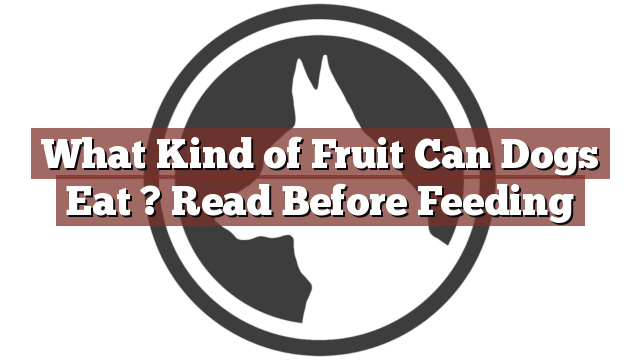Understanding Your Dog’s Dietary Needs
As a responsible pet owner, it is crucial to understand your dog’s dietary needs. While dogs are primarily carnivores, they can also benefit from certain fruits in their diet. Fruits are a great source of vitamins, minerals, and fiber, which can contribute to their overall health. However, it is important to note that not all fruits are safe for dogs to consume. Some fruits can be toxic and harmful to their health. Therefore, it is essential to know which fruits are safe and suitable for dogs before incorporating them into their diet.
What Kind of Fruit Can Dogs Eat? Read Before Feeding
Can dogs eat grapes? No, dogs should not eat grapes. Grapes, along with raisins, can lead to kidney failure in dogs, which can be life-threatening. It is best to avoid feeding grapes or raisins to your furry friend.
Can dogs eat apples? Yes, dogs can eat apples in moderation. Apples are an excellent source of vitamin A and C, as well as fiber. However, make sure to remove the seeds and core as they may pose a choking hazard or contain cyanide.
Can dogs eat bananas? Yes, dogs can eat bananas. Bananas are a healthy and nutritious treat for dogs. They are rich in potassium, vitamin C, and vitamin B6. However, remember to feed them in moderation as excessive consumption can lead to constipation.
Can dogs eat strawberries? Yes, dogs can eat strawberries. These juicy fruits are packed with antioxidants and vitamin C, which can benefit your dog’s immune system. Just make sure to remove the stem before serving.
Can dogs eat watermelon? Yes, dogs can eat watermelon. Watermelon is a refreshing summer treat for dogs. It is low in calories and high in vitamins A and C. However, make sure to remove the seeds and rind as they can cause digestive issues.
Pros and Cons of Feeding Fruit to Dogs
Feeding fruits to dogs has its pros and cons. On the positive side, fruits provide dogs with essential nutrients, vitamins, and antioxidants. They can improve their digestion, boost their immune system, and promote a healthy coat. However, it is important to feed fruits in moderation as some fruits contain natural sugars, which can lead to weight gain and other health issues. Additionally, certain fruits like grapes, raisins, and avocados are toxic and should never be fed to dogs.
In conclusion, while fruits can be a healthy addition to your dog’s diet, it is crucial to know which fruits are safe for them to consume. Always remember to introduce new fruits gradually and in moderation. If you have any doubts or concerns, it is best to consult your veterinarian before feeding any fruit to your furry companion. By understanding your dog’s dietary needs and making informed choices, you can ensure they lead a happy and healthy life.
Thank you for taking the time to read through our exploration of [page_title]. As every dog lover knows, our furry friends have unique dietary needs and responses, often varying from one canine to another. This is why it's paramount to approach any changes in their diet with caution and knowledge.
Before introducing any new treats or making alterations to your dog's diet based on our insights, it's crucial to consult with a veterinarian about [page_title]. Their expertise ensures that the choices you make are well-suited to your particular pet's health and well-being.
Even seemingly harmless foods can sometimes lead to allergic reactions or digestive issues, which is why monitoring your dog after introducing any new food item is essential.
The content provided here on [page_title] is crafted with care, thorough research, and a genuine love for dogs. Nevertheless, it serves as a general guideline and should not be considered a substitute for professional veterinary advice.
Always prioritize the expert insights of your veterinarian, and remember that the health and happiness of your furry companion come first.
May your journey with your pet continue to be filled with joy, love, and safe culinary adventures. Happy reading, and even happier snacking for your canine friend!

